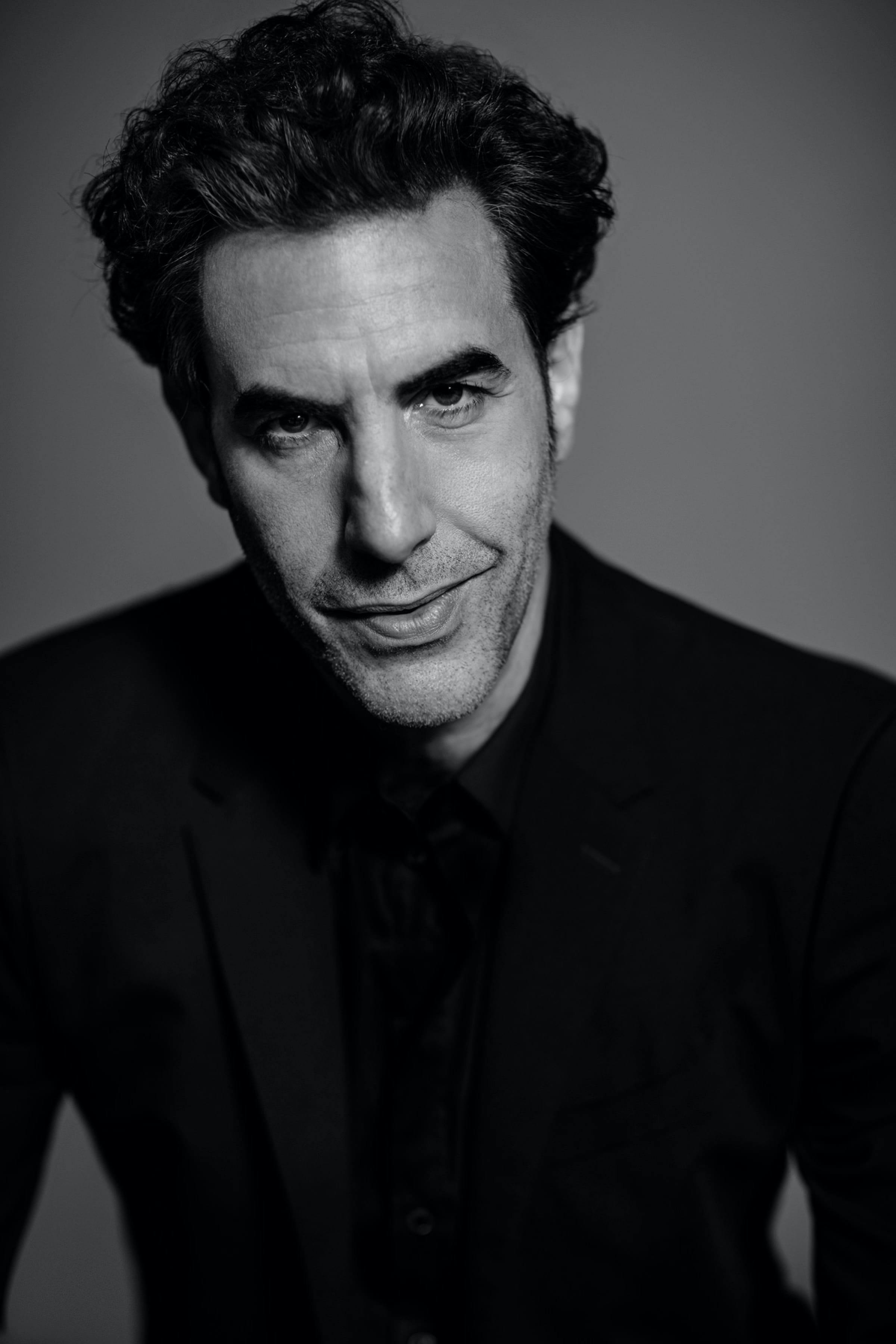Sacha Baron Cohen talks to Eric Idle about his 20 year-long journey to playing Abbie Hoffman in The Trial of the Chicago 7.
Sacha Baron Cohen has been preparing to play the role of progressive activist Abbie Hoffman for years. A decade before he joined the cast of Aaron Sorkin’s historical drama The Trial of the Chicago 7, he set up an audition with Steven Spielberg, who was at that time considering directing the film with an early version of Sorkin’s script. The part has effectively been his ever since, but his interest dates back even further: Baron Cohen researched Hoffman as part of his thesis at Cambridge University, where he studied history and explored a burgeoning interest in dramatic acting.
Sorkin’s film recently earned six Academy Award nominations, including one for Best Picture and a Best Supporting Actor nod for Baron Cohen. It recounts the chaotic demonstrations at the 1968 Democratic National Convention in Chicago and the subsequent federal prosecution of demonstration leaders, including Hoffman and Tom Hayden (Eddie Redmayne), who often clashed over their differing progressive visions.
He juggled work on 2020’s Borat Subsequent Moviefilm, for which he was Oscar nominated for Best Adapted Screenplay, with filming for Chicago 7.) While there was much for him to master, including Hoffman’s distinctive accent, he already shared with the activist an unsparingly critical view of the establishment and a talent for wielding a good joke; Hoffman, for instance, once showered traders on the floor of the New York Stock Exchange with dollar bills, in a not uncharacteristic political commentary.
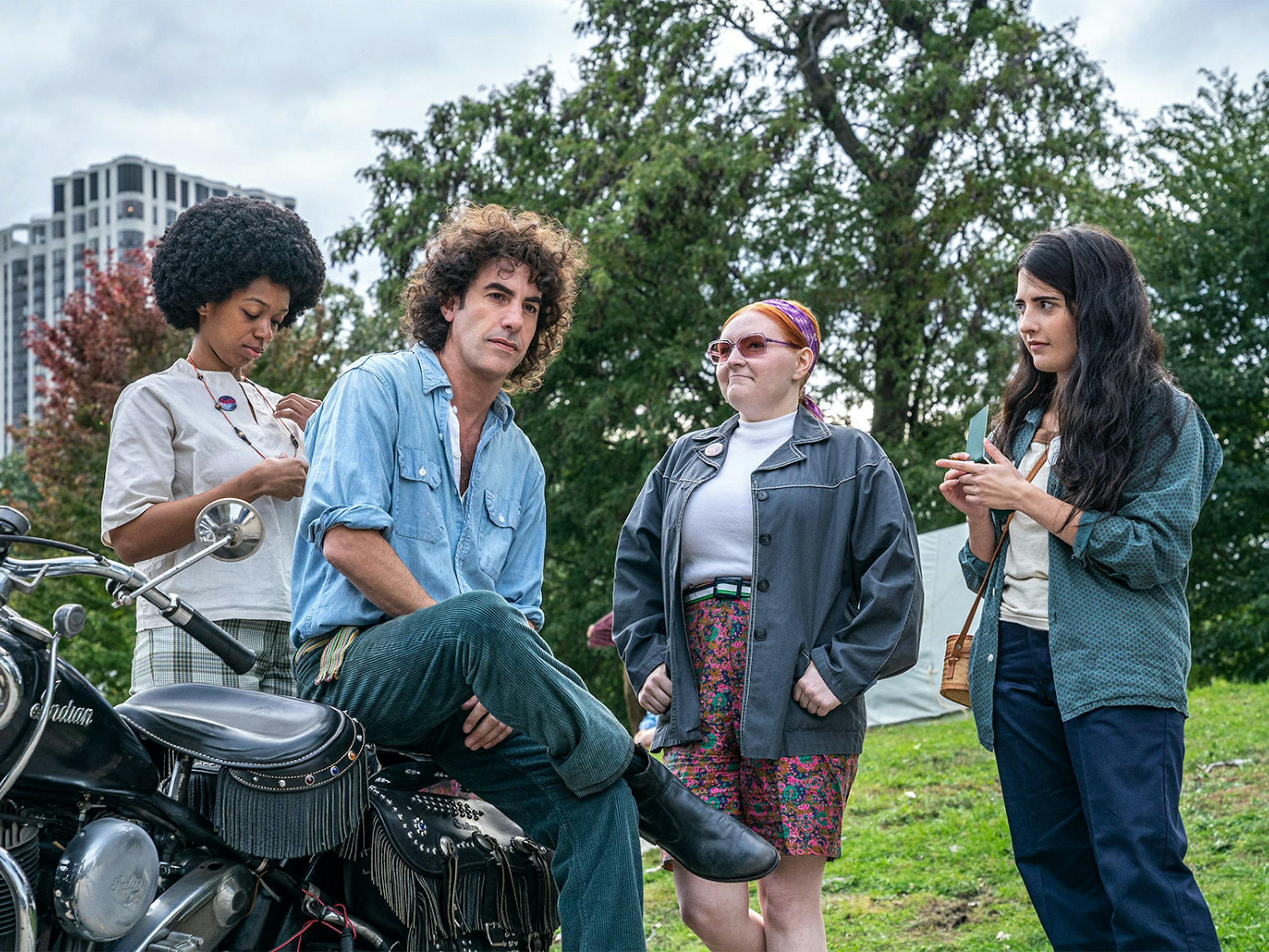
Abbie Hoffman (Sacha Baron Cohen) on the set of The Trial of the Chicago 7
“Growing up in England, for everyone who isn’t a member of the establishment or the upper class, there is this interclass conflict,” Baron Cohen shares, about his own sensibility. “Ali G was really a way to poke fun at the establishment and undermine their authority. Abbie Hoffman also had that quality where he realized that humor, when it’s done well, could be used to humble the powerful.”
To discuss the role, Baron Cohen spoke with a lifelong hero of his, Monty Python co-founder Eric Idle, in a conversation hosted by American Cinematheque.
Eric Idle: I was once talking to an actor, and he said that there are instinctive actors and there are actors who prepare very, very hard. You have both of those qualities going for you.
Sacha Baron Cohen: I mean, certainly something like Chicago 7, I was terrified about it. I was shooting Borat during the day, writing and rewriting Borat, and then studying with Tim Monich, this legendary dialect coach, working on Abbie Hoffman at night. And you’ve got a Sorkin script. He’s so particular about every comma. You want to completely, instinctively know the script.
At the same time, I was reading everything I could about Abbie Hoffman, going down and opening up archives and hearing his old standup. He was very influenced by Lenny Bruce. I’d find these brilliant lines, and I’d email Aaron every night and say, “Hold on, what about this brilliant line? What about this? I’ve just found this line from Abbie.” Aaron would say, “Thank you very much. It’s very kind of you to send that. This script is what it is.” And he was completely right. We weren’t making the Abbie biopic.
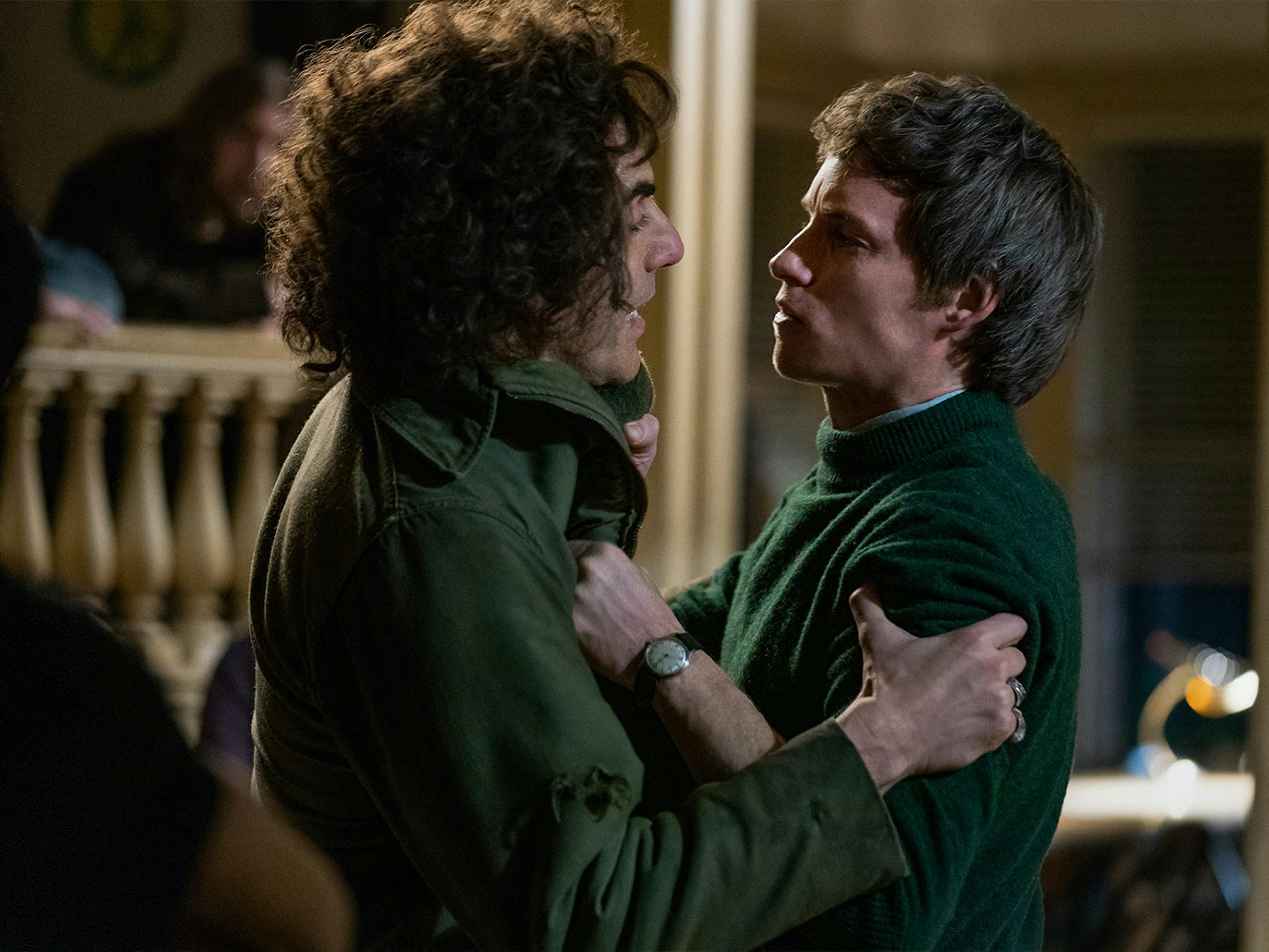
Abbie (Sacha Baron Cohen) and Tom Hayden (Eddie Redmayne)
EI: Just before Python was Abbie Hoffman, so we were following all of that. I remember getting his book, which is called Steal This Book. I think I paid for it to be a bit of a rebel. Did he really hate Hayden? Was that the story?
SBC: There was this rivalry — it’s basically the rivalry between the left and the hard left in all political movements around the world. There’s a scene in the movie where Tom Hayden and Abbie have this argument that becomes violent, and it just didn’t make any sense to me. Eddie Redmayne came up to me — he’s a lovely bloke, also from Cambridge, actually — and he said, “You know, it’s a story of these brothers who hate each other and then love each other at the end. That’s what Aaron’s always told us.” I go, “Aaron told you what?” He goes, “Yeah, five months ago, Aaron said this is a story about two brothers.” I go, “He never told me!” It actually makes the end of the movie so much more powerful: Abbie says to Tom, “You’re a true American hero,” and there’s this mutual respect. The brothers are back together. It’s beautiful writing.
You have to try and inhabit the character.
Sacha Baron Cohen
EI: I was intrigued by the fact that while you were at Cambridge you were writing a thesis about Abbie Hoffman. Did you meet him?
SBC: No, he had passed away by then. I was writing a thesis about Jewish radicals in the Black civil rights movement. Abbie Hoffman was one of a group of left-wing Jewish students who went down and joined the Freedom Riders. They then formed the basis of the anti-Vietnam War movement. I was obsessed with this character from the age of 20, really.
EI: Did you publish that thesis? Did it ever see the light of day?
SBC: It’s still in the Cambridge University libraries. They asked me to do a Ph.D. on Jewish-Black alliance around the world, and I tried it out for a few days. I found it rather lonely, and then decided to try and be an actor.
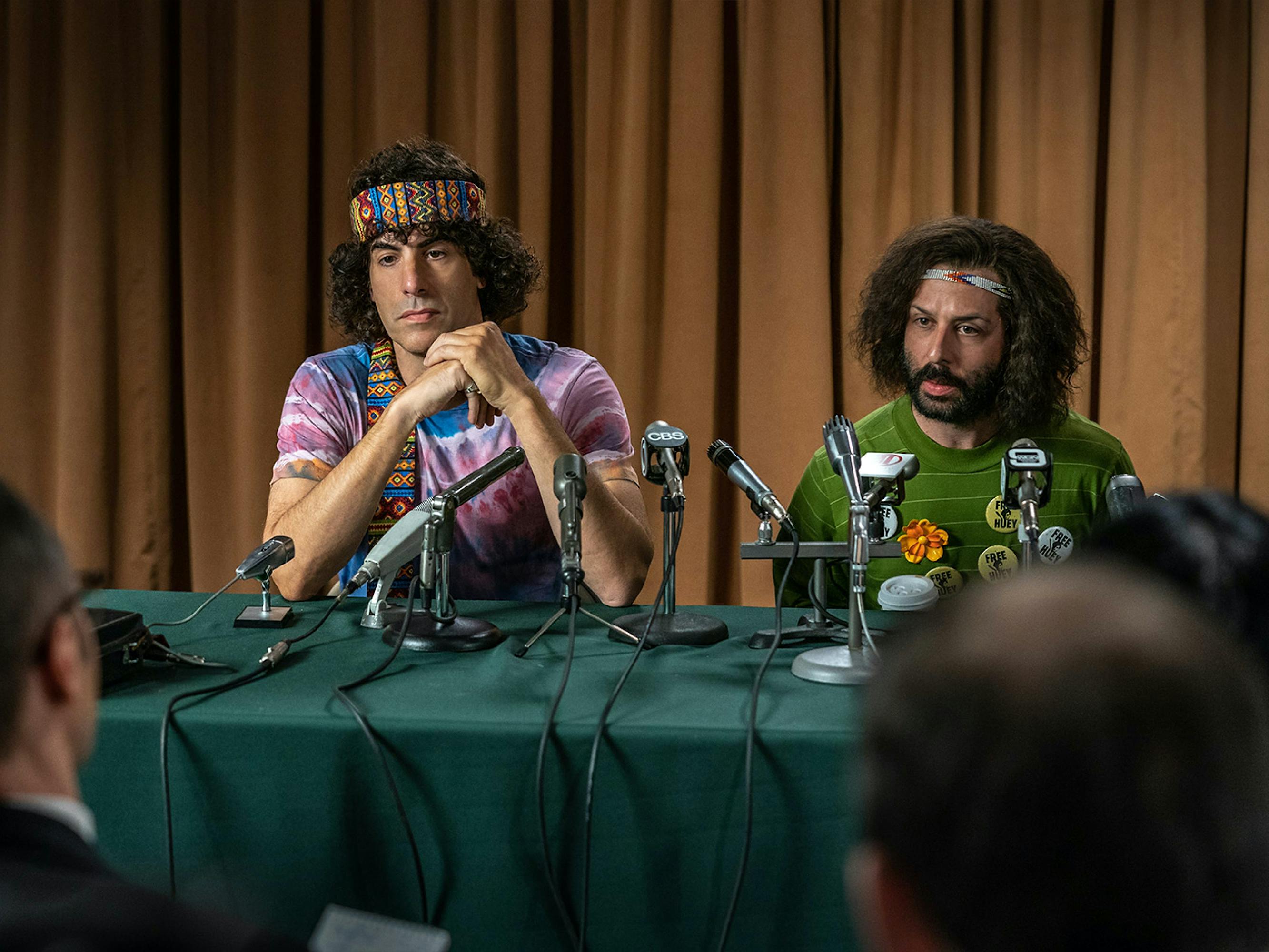
Abbie (Sacha Baron Cohen) and Jerry Rubin (Jeremy Strong)
EI: And your breakthrough was that first TV show with Ali G. What was it called?
SBC: The 11 O’Clock Show. Prior to that, I was struggling. I didn’t know anyone who was an actor. I didn’t know anyone who had managed to survive in that profession. I thought I’d give myself five years, and I was coming to the end of it. I was on the dole. The 11 O’Clock Show came about, and they go, “We’re interested in you as the host.” I didn’t really want to host. I go, “By the way, I’ve got this thing here. Can I just show you?” It was Borat outside the Houses of Parliament with a bunch of upper-class toffs who were trying to protect the right to hunt foxes. I showed that to the producer, the late Harry Thompson. He goes, “Give me something new for tomorrow that’s in that genre.” I came in the next morning with Ali G.
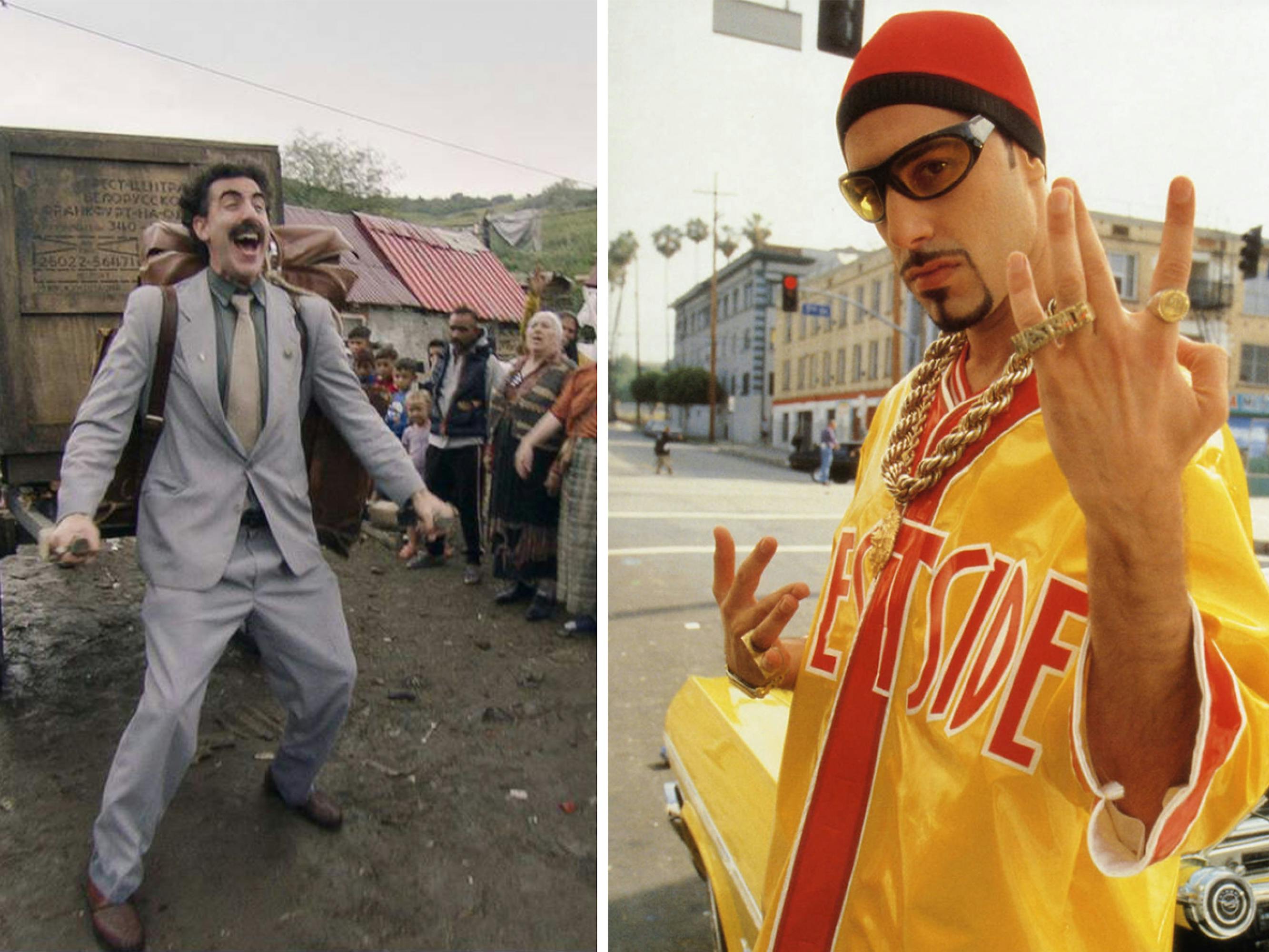
Sacha Baron Cohen’s alter egos: Borat Sagdiyev and Ali G
Left photo courtesy of Amazon Studios; Right photo by Pictorial Press Ltd / Alamy Stock Photo
EI: I think everybody who does comedy gets inspired by somebody else. Beyond the Fringe was like that for us, and Peter Cook and Dudley Moore. Peter Sellers was a big inspirer of yours, is that right?
SBC: Yes. And as you know, probably the reason I got into comedy was seeing Life of Brian when I was a small kid. My brothers snuck me into the cinema in Golders Green. They claimed that I was 18, even though I was about 10. At the same age I got into Python, I was also getting into Inspector Clouseau. At that time in British comedy, it felt like some of that stuff was very obvious: “Now I’m making a joke.” These completely believable characters that Sellers inhabited were always so hilarious. Was he a friend of yours?
EI: I only met him a couple of times, but he was not really knowable. He’d inhabit lots of characters all the time, but I think that what you did differently from us is that we are caricaturists but you do real acting. It seems to me that if you have to act with somebody in a room and fool them and you’re right there, that’s serious acting.
SBC: Normally when you do a movie, the jeopardy is that you’re a bit shit in the scene. In my movies occasionally it can get violent, if they realize you’re not who you say you are. You have to try and inhabit the character. You’ve got to make sure that the rhythm of your words is consistent, that the pitch is unique. The choice of words, the way you walk, the costume, even the way you smell, have to be completely believable and as one. I remember very early on I once did Borat and I had to take off my trousers in a scene and I had my underpants on. The scene ended, and they go, “You’re a fake.” I realized that every costume, whether it’s Abbie Hoffman or Borat or Ali G, it has to be complete.
But I just had to play Abbie. It had been such a long quest to play him that I couldn’t let it go.
Sacha Baron Cohen
EI: In Cambridge, you did a lot of acting. You played Tevye in Fiddler on the Roof, Cyrano de Bergerac. Big characters.
SBC: The reason I went to Cambridge was because of you. I went there for the express purpose of getting into the Cambridge Footlights [the comedy society that Monty Python came out of]. I auditioned in my Freshers’ Week, and I was rejected. I carried on auditioning twice a year until my final year, and I was always rejected. As a result, I was forced to go into straight acting. Immediately, I was cast in a Chekhov play as the lead. I managed to pull through this Chekhov play, and suddenly I was doing Tamburlaine the Great. We had a Royal Shakespeare Company director, and I was in Cyrano de Bergerac and Fiddler on the Roof, playing these deeply emotional characters. The best thing that could have happened to me was the Footlights crew rejecting me and me being forced to learn how to act.
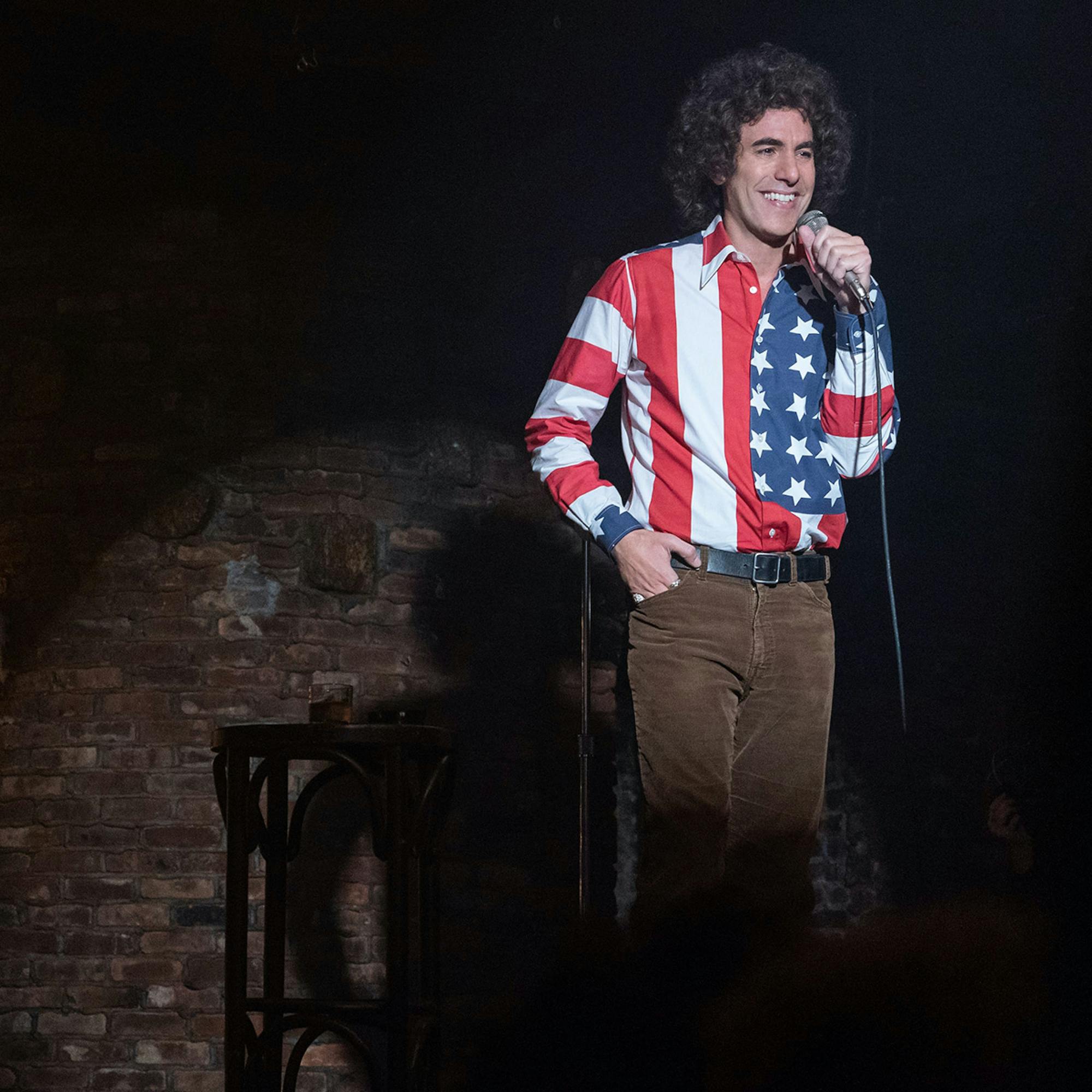
Abbie (Sacha Baron Cohen) doing stand-up in The Trial of the Chicago 7
EI: And you got nervier and edgier as you went on. What we don’t hear too much about is the writing that you do and the way you actually create these things. We never improvised because we were all about being writers and getting it all right.
SBC: My co-writers, who are fantastic, are completely meticulous. We really try to craft meticulous lines that we know are going to get a big laugh from the audience. My job is to hide those lines in a conversation and make sure that the character is consistent enough. When you say to Buzz Aldrin, “What was it like to walk on the sun?” you want him to not think that you’re making a joke. I’m obsessed with making sure that the wording itself is perfect. That was what drew me to Aaron Sorkin as well. You’ve already got 70 percent of your work done. The writing on the page is incredible.
EI: As I understand it, The Trial of the Chicago 7 was more like a play, with everyone performing as an ensemble.
SBC: I mean, you had some of the greatest actors in the world there — Eddie Redmayne and Mark Rylance and Frank Langella, these giants of the stage and screen. It was quite intimidating. You had all the people there, and they would basically cheer at the end of a rehearsal because it was like watching great theater. At the time, there was a dilemma, which was, Do we carry on shooting Borat? But I just had to play Abbie. It had been such a long quest to play him that I couldn’t let it go.
EI: It’s about 20 years of research, isn’t it? I’m thrilled for you. I just think it’s wonderful work, Sacha, and I’m very proud of you, if I can say that.
SBC: Eric, if I could go back to myself at nine years old watching you on screen in Golders Green and imagine that one day you’d be virtually having a conversation with me, telling me that I’m good at what I do, I wouldn’t believe it. You are a hero of mine.
EI: Well, thank you, Sacha. On that, do we say goodbye?
SBC: Was this live?
EI: Yes.
SBC: Oh bloody hell.
